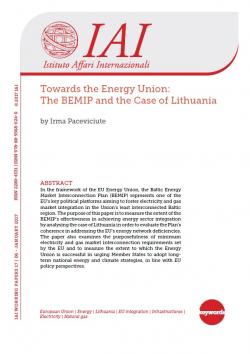Towards the Energy Union: The BEMIP and the Case of Lithuania
In the framework of the EU Energy Union, the Baltic Energy Market Interconnection Plan (BEMIP) represents one of the EU’s key political platforms aiming to foster electricity and gas market integration in the Union’s least interconnected Baltic region. The purpose of this paper is to measure the extent of the BEMIP’s effectiveness in achieving energy sector integration by analysing the case of Lithuania in order to evaluate the Plan’s coherence in addressing the EU’s energy network deficiencies. The paper also examines the purposefulness of minimum electricity and gas market interconnection requirements set by the EU and to measure the extent to which the Energy Union is successful in urging Member States to adopt long-term national energy and climate strategies, in line with EU policy perspectives.
-
Details
Roma, IAI, January 2017, 17 p. -
Issue
17|06 -
ISBN/ISSN/DOI:
978-88-9368-024-0
Introduction
1. BEMIP in the framework of the EU energy strategy
1.1 The gradual amplification of the EU’s mandate in the energy sector and the Energy Union
1.2 Regional focus: the Baltic Energy Market Interconnection Plan
2. Lithuania’s energy profile and BEMIP-induced sectorial changes
2.1 A general overview of the Lithuanian energy sector
2.2 The BEMIP: gradual change in the energy landscape of Lithuania
3. The BEMIP, Energy Union and the EU: Lithuania in a broader perspective
3.1 Improving the EU energy interconnections
3.2 Budget and costs
3.3 Regional cooperation and rivalry
3.4 Sustainable energy transition
Conclusion
References



